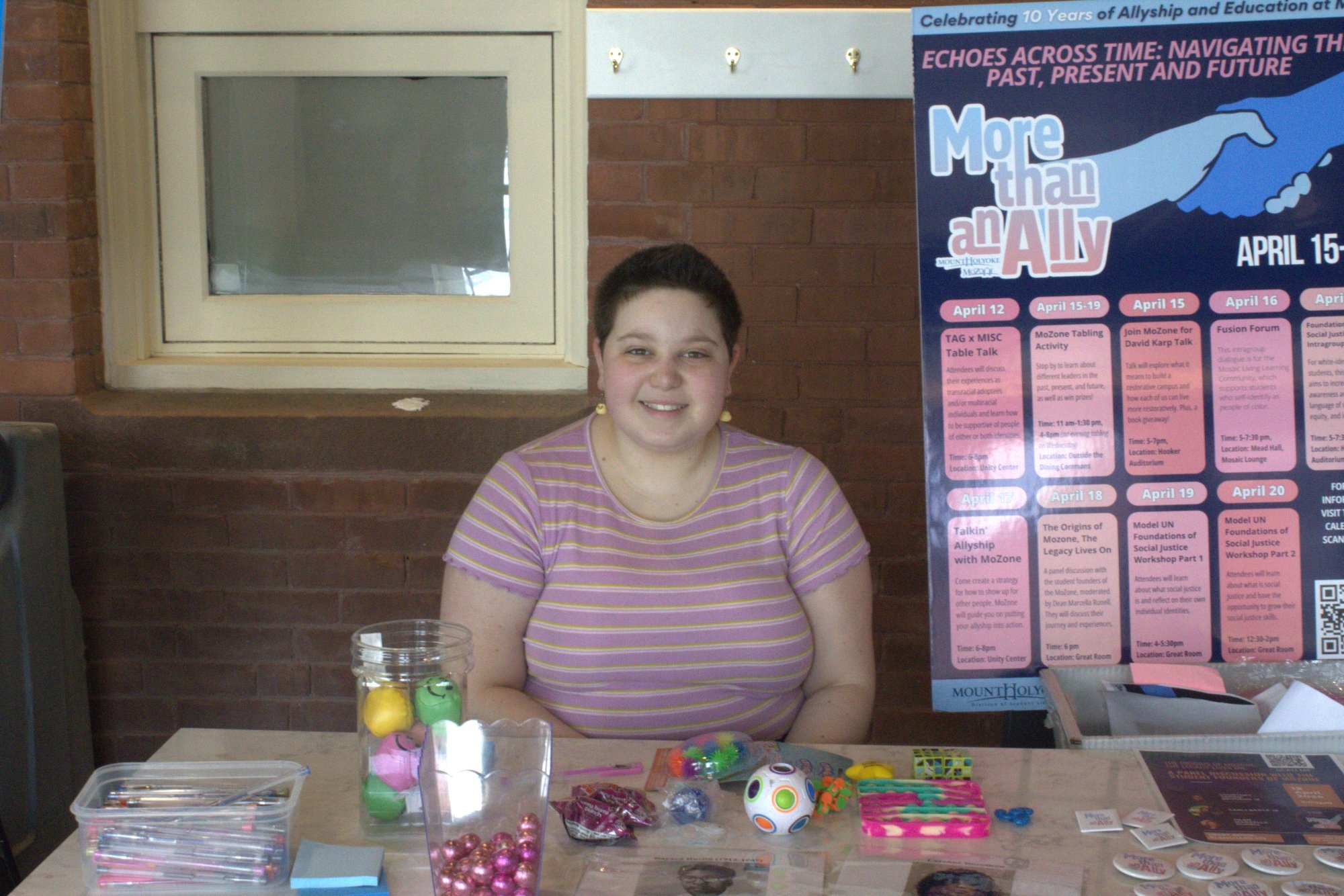Juliette Auslander ‘26 at the tabling for More Than An Ally Week. Photo by Annette Darpoh ‘27.
By Emma Quirk ’26
Publisher, Photos Editor & Staff Writer
From April 15-19, MoZone Peer Educators, the Office of Community and Belonging and other campus partners held events dedicated to allyship and social justice for “More Than An Ally Week 2024.”
This year’s theme, “Echoes Across Time: Navigating the Past, Present, and Future,” commemorates the 10-year anniversary of MoZone; the annual Trailblazers of Color Leadership Conference, dedicated to celebrating the accomplishments of people of color and prompting dialogues; and #MoHonest, a student-run movement protesting racism on campus. In September, the College will also mark 10 years of its gender-inclusive admissions policy.
MoZone peer educators were integral parts of organizing and hosting MTAA events.
“My favorite part of being a MoZone Peer Educator is being able to connect with other people over a topic that I really care about,” Luca Gorman ’26, a MoZone peer educator, said in an interview with Mount Holyoke News. “I love bonding with my co-workers over sharing the important work of social justice education, and connecting with other students to talk about and create shared language and understanding around topics of diversity.”
Kayla Scott-Mcdowell ’24 echoed that statement. “My favorite part [of being a MoZone Peer Educator] is learning and educating others,” she said.
Each day, MoZone hosted a past, present and future tabling activity. At the table, MoZone peer educators shared information about different activists, from model and actress Quannah Chasinghorse to author Ceyenne Doroshow and rapper and activist Sonita Alizadeh.
“I think it is really important to see the people who were doing the work before you, the people who are doing the work, right now, right beside you, and the people [like you] who will continue to do the work of advocacy in the future,” Gorman said. “I had a lot of fun picking out all of the activists we included at our table this week. … Frances Kerr, in specific, was really interesting to research because she was the first Black faculty member at Mount Holyoke in 1961.”
Other events in More Than An Ally Week included “Talkin’ Allyship with MoZone,” “Fusion Forum: Cultivating an Inclusive Community through Conversations,” “Foundations of Social Justice Intragroup Dialogue For White Identified Students,” a “Model United Nations Foundations of Social Justice” workshop and “The Origins of MoZone, The Legacy Lives On: A Panel Discussion.”
Both the “Fusion Forum: Cultivating an Inclusive Community through Conversations” and “Foundations of Social Justice Intragroup Dialogue for White Identified Students” were closed spaces for intragroup conversations.
“Fusion Forum” was held for the students who live in the Mosaic Learning Living Community. The Mosaic LLC is for students of color, and this dialogue was meant to explore similarities and differences in experiences. “Foundations of Social Justice” was held for white students and was meant to promote conversations about privilege, oppression and allyship.
“The Origins of MoZone” panel featured the student founders of the MoZone peer education program, Courtney Janine Brunson ’16 and Carly Basile ’16, in conversation with Vice President for Student Life and Dean of Students Marcella Runell. Brunson and Basile shared their experiences advocating for social justice and a peer education program on campus.
MoZone partnered with Five College Model UN to host a workshop on the foundations of social justice. Nicole Mattiacci ’27, director of special events for the FCMUN XIV conference, and Zoey Pickett ’26, another FCMUN member, worked with Scott-McDowell and the other MoZone peer educators to put on this event.
Mattiacci discussed the importance of the workshop in an interview with Mount Holyoke News. “I think this is an important workshop to hold because oftentimes conversations about social justice and diversity, equity and inclusion aren’t included in many Model UN conferences, which is a big missed opportunity,” she said. “As someone who has done Model UN since high school, instances of people including insensitive comments within their speeches while posing as a country that aligns with those views are not uncommon … especially since Model UN is a predominantly white activity that tackles important global issues and sensitive topics.”
An overarching theme of every MTAA week is the idea that allyship is an ongoing practice. “Learning, showing up for people and actually doing action for someone who holds different identities is being more than an ally to me. Actively engaging in social justice work is being more than an ally,” Scott-McDowell said. “Additionally, it’s not a one day process or being an ally for one day. People have to realize it’s for a lifetime.”
Gorman, a peer educator, also shared thoughts on the week’s significance. “To me, [MTAA] means a whole week where students are presented with a plethora of opportunities to work on their allyship,” Gorman said. “Allyship is incredibly important, no matter who you are. … it is an excuse for us to continue to talk about and emphasize the fact that no one is liberated until we are ALL liberated, and every social justice movement is relational and intersectional due to the complexity of human identities.”
“I hope that as MoZone continues its work on Mount Holyoke Campus that everyone, regardless of their identities, can be an ally and show up for others,” Scott-McDowell said.

